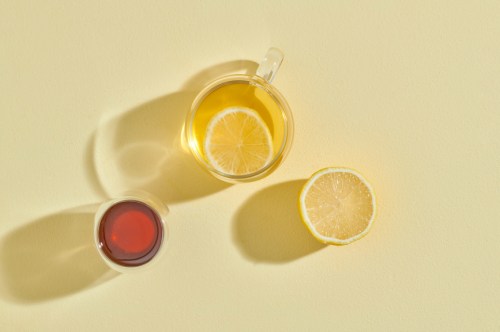FYI: Adding a Squeeze of Lemon Juice to Green Tea Can Make Its Antioxidant Properties 5+ Times More Effective
Learn the science-backed benefits of drinking green tea with lemon and how the combination can boost the antioxidant level nearly five times.

For many, a glass of water isn’t complete without a wedge of lemon. And while a squeeze of citrus can certainly work wonders when it comes to livening up an otherwise meh cup of water, lemon water has also long been in the limelight thanks to its assumed health benefits.
Experts in This Article
registered dietitian and prenatal and postnatal health expert
The (lemon) twist? Research shows that the benefits of lemon are kind of overhyped and… not as life-changing as we may have initially thought when paired with only plain ol’ water. All good. After all, hydration is key for every bodily function.
However, another study revealed that consuming lemon—or any other citrus, for that matter—can have more health-promoting prowess when paired with green tea. While there are already numerous benefits of green tea, according to researchers at Purdue University, a splash of lemon juice can boost green tea’s antioxidant capacity by five to 10 times (!).
We caught up with Lauren Manaker, MS, RDN, LD, CLEC, CPT, a registered dietitian based in Charleston who shared more about why lemon should be your mug of green tea’s new main squeeze and how this combination can give you an extra boost of antioxidants.
Why drinking green tea with lemon is a deliciously healthy idea
According to Mario Ferruzzi, a professor of food science at Purdue University and the study’s lead author, citrus juices helps maintain green tea’s high antioxidant levels even as it’s being digested. In the study, Ferruzzi analyzed the effect of various beverage mix-ins on catechins—also classified as flavonols (flavan-3-ols)—which are naturally occurring antioxidants found in green tea that are anti-inflammatory and have been linked to many health-promoting benefits.
The study showed that combining green tea with either citrus juices or vitamin C can increase the amount of catechins available for the body to absorb, which can potentially help reduce your risk of chronic low-grade inflammation, cancer, neurodegenerative disease, heart attack, and stroke. Manaker says this combo helps make drinking an already antioxidant-rich drink even more efficient. “Drinking green tea on its own has already proven to offer a slew of health benefits, and just two cups provides the recommended daily amount of the flavan-3-ols plant compounds we should be consuming every day. But according to this new data, pairing green tea with citrus juice may offer even more of a benefit,” Manaker says.
Ferruzzi says the discovery is due to basic nutrition science. According to their findings, catechins are relatively unstable in non-acidic environments—such as the intestines—and less than 20 percent of the total amount remains after digestion. “Off the bat, you are eliminating a large majority of the catechins from plain green tea. We have to address this fact if we want to improve bodily absorption,” Ferruzzi says. That’s where lemon (and other forms of citrus) comes into play.
To unveil the best catechins-stabilizing additive for green tea, Ferruzzi tested juices, creamers, and other liquids that are either commonly added to fresh-brewed tea or used to make ready-to-drink tea products by putting them through a model simulating gastric and small-intestinal digestion. The study showed that citrus juice increased catechin levels by more than five times. Similarly, Ferruzzi analyzed the effects of packaged drinks: “Ascorbic acid, or vitamin C, used to increase shelf life in ready-to-drink products, increased recovered levels of the two most abundant catechins by sixfold and 13-fold, respectively.”
Ferruzzi discovered that lemon juice caused 80 percent—the highest among the liquids tested—of the green tea’s catechins to remain. Aside from lemon, he found that orange, lime, and grapefruit juices also exhibited stabilizing effects. “If you want more out of your green tea, add some citrus juice to your cup after brewing or pick a ready-to-drink product formulated with ascorbic acid,” Ferruzzi says.
Can other green tea mix-ins have a similar effect?
If citrus isn’t your go-to green tea addition, all good. Ferruzzi found that soy, dairy, and rice milk appeared also to have moderate stabilizing effects. Although, he notes that those results may be misleading since a chemical interaction between milk proteins and tea catechins will likely degrade its effects when exposed to enzymes within a healthy human digestive system.
What’s more, if green tea isn’t your jam, Ferruzzi suspects that black tea (made from the same plant) will offer similar results, although it contains fewer catechins.
Finally green tea with lemon isn’t the only way to get your daily dose of catechins. According to Manaker, the antioxidant compound is also prevalent in cocoa and berries. So, feel free to take your pic(nic).
An RD delves into the differences between green tea and matcha:
Sign Up for Our Daily Newsletter
Get all the latest in wellness, trends, food, fitness, beauty, and more delivered right to your inbox.
Got it, you've been added to our email list.










